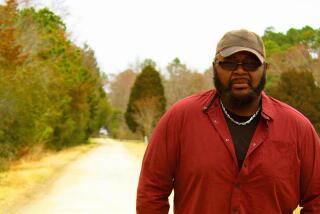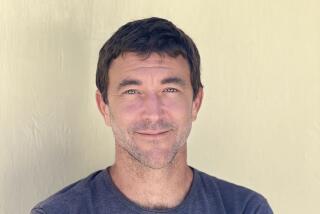Ennis Cosby’s True Story Was of Triumph
- Share via
To the extent that the world knew Ennis Cosby, it was as a shining star of his father’s hilarious imaginary life. He was the sly adolescent whose first words upon turning 16 were, allegedly: “Wanna Porsche.” He was the kid who shaved his head for no reason and attacked his sisters with wet towels.
He was Theo Huxtable, the TV son on “The Cosby Show,” whose relationship with his father redefined, with long-overdue dignity, the entertainment industry’s portrayal of African American families. He was, in short--and though the country scarcely knew him--America’s son.
But the private, offstage story of Ennis Cosby’s life could have been a drama of heroic proportions in itself: How a beloved child struggled in the shadow of a celebrity father and a mom who, like her husband, has a PhD. How he triumphed over dyslexia and finally found himself.
How he went on to become a tutor to the poor and homeless. And then, tragically, how on Thursday, he died.
“He was a kid becoming a man, with everything in the world going for him,” said famed civil rights leader Andrew Young, in a passionately worded response to the street violence that claimed the life of the 27-year-old man he regarded as a friend.
“I saw in him hope for all youth,” Young’s statement said, calling Cosby “a black prince . . . shot down for nothing.”
Despite his father’s high-profile career, Ennis Cosby spent most of his life shielded from the public glare. Bill Cosby and his wife, Camille, assiduously protected the privacy of their children, and stressed education over the allure of Hollywood.
In his father’s routines, however, Ennis was a constant source of material, and in interviews, Cosby often spoke about the parallels between his own family and that of Dr. Heathcliff Huxtable, the lead character on the wildly popular 1980s comedy series “The Cosby Show.”
In both the sitcom and real life, Cosby was the devoted father of four daughters and a son, and the tales of life with his son yielded some of Cosby’s most touching and most human comedy.
Often, as Cosby spoke in interviews about his family, the loving detail in which he laid out his yarns revealed as much about the deep bonds between the son and the father as they did about the workings of the comedian’s mind.
In a 1985 Playboy magazine interview, for instance, Cosby told a story about how Ennis, at 14, had told him that he had been talking to his friends, and they felt he should get a car at 16. It would be nice, the son added, if that car were a new Corvette.
Cosby told him that he would happily give him the car if, for the next two years, the boy threw himself into his schoolwork.
“My son gets very quiet. Finally he looks up at me and says, ‘Dad, what do you think about a Volkswagen?’ ” Cosby joked.
In the next breath, however, the comedian added proudly: “Young Ennis, by the way is now 6 feet 3 inches tall.”
Cosby boasted about his kid, detailing his son’s athletic prowess and how Ennis was “a gentleman athlete,” until the interviewer changed the subject.
What Cosby didn’t talk about in that interview was the concern that he and his wife, who has a doctorate in education, had for Ennis. Though Cosby joked about it, Ennis’ school performance in those years was anything but funny offstage.
Years later, Cosby would tell the New York Times another story about Ennis’ adolescent years.
“It bothered me that Ennis was not doing his schoolwork,” Cosby said in that 1992 interview. “I sat him down and said, ‘We’re going to talk, and I want you to say whatever is on your mind.’ ”
That conversation ended up being reenacted years later on an episode of “The Cosby Show,” as Theo, the middle child and only son, comes home with lackluster grades and tells his father, the successful obstetrician, that the pressure to succeed is just too much.
“[Ennis] said he wanted to be regular people,” Cosby recalled. “He didn’t want the pressure of studying.”
It wasn’t until Ennis Cosby finally made it to college four years later that the family learned the real reason for his frustration in school: Tests determined that he was dyslexic--a possibility that had never crossed his high school teachers’ minds.
Overjoyed to discover the source of his struggle, the Cosbys enrolled their son in a special curriculum. There, they would later say, he learned how to cope and effectively transformed his life.
Ennis Cosby, his father would later boast, returned to college after completing the program for dyslexics, and in the space of two years, brought his grade point average up from a D to an A.
His mother told Jet Magazine he was on the dean’s list when he graduated from Morehouse College in Atlanta, where he received a bachelor’s degree in psychology.
That experience also became the inspiration for an episode of “The Cosby Show”: In the final episode, Theo overcomes dyslexia to graduate from college, and his proud father can’t get enough seats for his graduation.
Those who knew him in college said that Ennis never expected special treatment because of his famous dad.
“We would talk sometimes in my office and his thing was that he wanted to do things on his own, personally and professionally,” said his advisor, professor Harold Braithwaite, who now heads the college’s psychology department. “He wanted people to accept him as Ennis, not as the son of Bill Cosby. He was not your typical Hollywood kid, if there is such a thing. Not the kind that usually ends up in the news. He was a compassionate person and sensitive to other people.”
That sensitivity turned to charity when Ennis volunteered for a research program on homelessness and addiction, working regularly at a homeless shelter in Atlanta’s Midtown, Braithwaite said.
“It was something he really wanted to do, and he seemed to get a lot of enjoyment out of it and a great sense of accomplishment,” Braithwaite said.
At Morehouse, he had begun working with children, and was so beloved by his professors that, on Thursday, they could scarcely speak without weeping.
Professor Jeannette E. Fleischner said Cosby dreamed of creating a school and clinic for poor children with learning problems.
“He wanted to make sure that kids who might not have the opportunity to have the help that he had had would get it. So he did all he could to help poor kids,” she said.
“That was his expressed goal,” added Fleischner. “He talked about learning as much as he could, and he was very eager to have as much practical experience as he could so that he remained at the public school where he did a first internship for far longer than many students would.”
At the time of his slaying, friends and authorities said, Ennis Cosby was preparing to end a two-week vacation in Los Angeles and return to Teachers College at Columbia University in New York, where he was studying for his doctorate in special education with emphasis in reading disabilities.
Tim McGhee, head coach of the lacrosse team at Columbia, said Ennis had played midfield on the team and was as self-effacing as he was popular. So handsome that he had been approached by modeling agencies, Ennis Cosby was known on the team for his outgoing nature and ready smile.
McGhee said the young Cosby was matter-of-fact about his famous lineage.
“He said to me, ‘I’ve been Bill Cosby’s son my whole life,’ ” the coach recalled.
“I thought he was just another poor graduate student just like the rest of us,” said Ted Kim, who played lacrosse for two years with Cosby.
“He was a damn good kid,” said another friend.
In his own way, those who knew him said, the younger Cosby had achieved something remarkable.
In the face of obstacles that might have crippled a lesser man--the often devastating pressure that comes with being the child of a famous man, and the handicap of a learning disability--he had managed to carve out an identity of his own.
“He was my hero,” his father wept as he hurried past the cameras on Thursday morning.
Times staff writers John J. Goldman and Andrea Ford contributed to this story. Goldman reported from New York, Ford from Los Angeles.
More to Read
The complete guide to home viewing
Get Screen Gab for everything about the TV shows and streaming movies everyone’s talking about.
You may occasionally receive promotional content from the Los Angeles Times.







